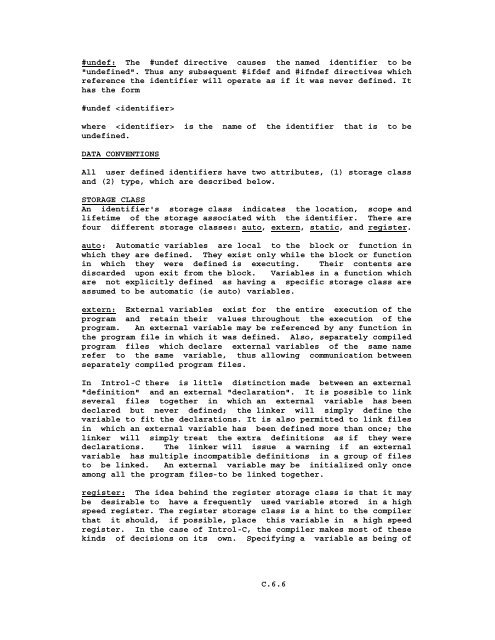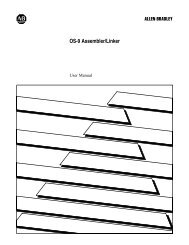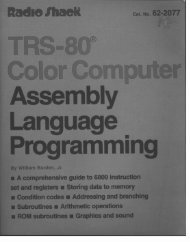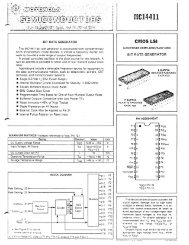INTROL-C COMPILER REFERENCE MANUAL
INTROL-C COMPILER REFERENCE MANUAL
INTROL-C COMPILER REFERENCE MANUAL
You also want an ePaper? Increase the reach of your titles
YUMPU automatically turns print PDFs into web optimized ePapers that Google loves.
#undef: The #undef directive causes the named identifier to be<br />
"undefined". Thus any subsequent #ifdef and #ifndef directives which<br />
reference the identifier will operate as if it was never defined. It<br />
has the form<br />
#undef <br />
where is the name of the identifier that is to be<br />
undefined.<br />
DATA CONVENTIONS<br />
All user defined identifiers have two attributes, (1) storage class<br />
and (2) type, which are described below.<br />
STORAGE CLASS<br />
An identifier's storage class indicates the location, scope and<br />
lifetime of the storage associated with the identifier. There are<br />
four different storage classes: auto, extern, static, and register.<br />
auto: Automatic variables are local to the block or function in<br />
which they are defined. They exist only while the block or function<br />
in which they were defined is executing. Their contents are<br />
discarded upon exit from the block. Variables in a function which<br />
are not explicitly defined as having a specific storage class are<br />
assumed to be automatic (ie auto) variables.<br />
extern: External variables exist for the entire execution of the<br />
program and retain their values throughout the execution of the<br />
program. An external variable may be referenced by any function in<br />
the program file in which it was defined. Also, separately compiled<br />
program files which declare external variables of the same name<br />
refer to the same variable, thus allowing communication between<br />
separately compiled program files.<br />
In Introl-C there is little distinction made between an external<br />
"definition" and an external "declaration". It is possible to link<br />
several files together in which an external variable has been<br />
declared but never defined; the linker will simply define the<br />
variable to fit the declarations. It is also permitted to link files<br />
in which an external variable has been defined more than once; the<br />
linker will simply treat the extra definitions as if they were<br />
declarations. The linker will issue a warning if an external<br />
variable has multiple incompatible definitions in a group of files<br />
to be linked. An external variable may be initialized only once<br />
among all the program files-to be linked together.<br />
register: The idea behind the register storage class is that it may<br />
be desirable to have a frequently used variable stored in a high<br />
speed register. The register storage class is a hint to the compiler<br />
that it should, if possible, place this variable in a high speed<br />
register. In the case of Introl-C, the compiler makes most of these<br />
kinds of decisions on its own. Specifying a variable as being of<br />
C.6.6

















